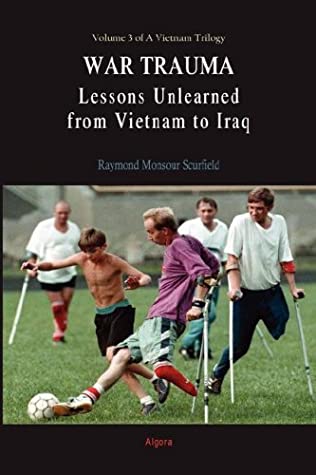

 |

|

The average rating for War trauma based on 2 reviews is 4.5 stars.
Review # 1 was written on 2016-02-10 00:00:00 Christopher Peace Christopher PeaceHomer is ever present in modern culture, but his power is often reduced to a kind of cartoon. The Iliad becomes a sword-and-sandals Hollywood cliche and the Odyssey becomes the original road movie. Shay brings the Iliad back to reality by shining a new light on the ferocious pain of Achilles, pain that today might be called PTSD, but which Shay calls "moral injury." Shay reads the Iliad as a psychologist and observes in Achilles some of the same symptoms that he sees in his patients, many of whom are veterans of the Vietnam War. The common denominator -- and the thing that differentiates many Vietnam veterans from WWII vets -- is an element of betrayal and disrespect that became the core of the Vietnam experience. Shay calls this "moral injury." The anger of Achilles stems from the disrespect shown him by Agamemnon, and this anger blossoms into grief and rage, causing a breakdown in the soldier's social and moral constructs. When this happens in a combat theater, as it frequently did in Vietnam, the results are catastrophic. The parallels that Shay draws between Achilles and the experiences of many Vietnam veterans are minutely detailed, including the gut-wrenching voices of the veterans themselves, and his argument is very persuasive. His conclusion is both instructive and practical. He doesn't bewail the existence of war and prescribe an idealistic pacifistic solution. Instead, in a deliberate and concrete way, he shows how vitally important leadership qualities are in the military. In some ways this book seems to be written especially for military commanders, as a reminder that the lesson of the Iliad is still ringing in our ears: to preserve the moral horizon, whatever the circumstances. |
Review # 2 was written on 2015-09-11 00:00:00 Phil Phipps Phil PhippsJonathan Shay is a psychotherapist - and impressive amateur classicist - who has spent decades treating Vietnam veterans with severe PTSD. In this fascinating book, he analyzes what he sees as the moral breakdown of Achilles in terms of factors common to the Vietnam War. The first section of the book outlines these factors: a betrayal of "what's right"; the shrinkage of the social and moral horizon; grief at the death of a special comrade; guilt and wrongful substitution; and going berserk (a clinical condition, not slang). In each of the chapters he describes these conditions as revealed through years of treating veterans, often quoting transcripts of therapy sessions, and analyzes their presence in The Iliad. In the second section he goes through soldiers' common reactions to these conditions, again drawing from Vietnam veterans' accounts, and demonstrates the same reactions in Achilles. It's convincing and utterly compelling. I'm no classical scholar, but I have read The Iliad many times and can appreciate his deep understanding and meticulous examination. His book is worth multiple readings. In fact, Achilles in Vietnam has filled a role in my understanding similar to movies of favorite novels, like "Gone With the Wind" - now I can't read The Iliad without this as context and subtext! I also was stunned by the descriptions of combat in Vietnam ' both the conditions of guerilla warfare against the Viet Cong and common U.S. military practices seemed designed to inflict maximum psychological damage on our soldiers. Be forewarned: this is not for the faint of heart. If you've studied the Vietnam War then much of this will be familiar. If not, brace yourself; the accounts are from men whose combat trauma was debilitating enough that they sought professional help. Also, Dr. Shay quotes veterans' words verbatim, and the profanity is almost as stunning as the substance. I have no tolerance for profanity and felt like I needed to wash out my head with a power hose, yet at the same time I couldn't help feel sorry for both the lack of education that often produces such a low level of language and the obvious crutch that profanity was for these men; if the eloquent can't find words to describe such horrors, what hope had they? (Not all the interviewees swear four or five times in a sentence; there are distinct levels of language corresponding to levels of education, a fact that the Vietnam veterans I know are quick to assert.) The final section of the book focuses on PTSD and possible healing, with less analysis of Achilles; nonetheless, it's fascinating reading. |
CAN'T FIND WHAT YOU'RE LOOKING FOR? CLICK HERE!!!